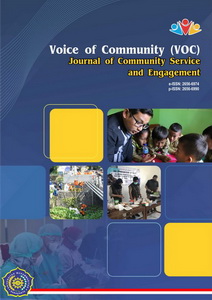Strengthening the Readiness of Tourism Village Institution Through the Assistance in Developing Standard Operating Procedure: Case Study of Mundu, Klaten Regency
DOI:
https://doi.org/10.23917/voc.v5i2.11339Keywords:
Standard Operating Procedure , tourism village, empowerment , community service, economy, Renewable EnergyAbstract
Mundu Village is a village in Indonesia located in Tulung District, Klaten Regency, Central Java Province. The Statistics Indonesia (BPS) revealed that more than 60% of the residents of Mundu Village own cattle. This condition has led the community to utilize cattle manure as a source of renewable energy. Additionally, cattle manure is processed into fertilizer to nourish various plants, some of which serve as a food source for the livestock. This activity is known as zero-waste agriculture. This condition encouraged the Mundu Village government to establish a Tourism Village that offers educational tourism based on renewable energy. Mundu Village already has several buildings to support the realization of the Tourism Village. However, Mundu Village is not yet ready in terms of institutions. The community service team from the Faculty of Economics and Business and the Faculty of Law of Muhammadiyah University of Surakarta provided education and assistance in preparing Standard Operating Procedures (SOPs) to support the acceleration of institutional readiness in the effort to establish an Educational Tourism Village based on Renewable Energy. The activity proceeded successfully, marked by the preparation of a draft SOP that is ready to be approved, supporting the institutional strengthening of the Tourism Village.
Downloads
References
Fehr, A., Urushadze, T., Zöller, N., Knerr, B., Ploeger, A., & Vogtmann, H. (2020). Establishing A Sustainable Waste Management System In A Transitional Economic Context: Analysis Of The Socio-Economic Dynamics. Sustainability, 12(9), 3887.
Hasriyanty, H., Nasir, B. H., Sulaeman, S., & Lasmini, S. A. (2024). Application Of Zero Waste Farming System Technology For The Empowerment Of Farmers And Breeders In Sigi Regency, Central Sulawesi. Community Empowerment, 9(2), 225–235.
Hidayah, N., Puspitasari, I. F., Andriyani, N., & Afifah, Z. M. (2022). Studi Kelayakan Dan Dampak Ekonomi Pengelolaan Limbah Peternakan Skala Rumah Tangga. Jurnal Pendidikan Ekonomi: Jurnal Ilmiah Ilmu Pendidikan, Ilmu Ekonomi Dan Ilmu Sosial, 16(2), 220–235.
Hidayat, D. F. (2022). Desain Metode Ceramah Dalam Pembelajaran Pendidikan Agama Islam. Inovatif: Jurnal Penelitian Pendidikan, Agama, Dan Kebudayaan, 8(2), 356–371.
Kewa, F. A., & Mahardika, C. B. D. P. (2024). Penerapan Konsep Zero Waste Farming Dalam Sistem Pola Integrasi Tanaman Pangan Dan Ternak Kambing:(Studi Kasus Di Desa Katakeja Kecamatan Atadei Kabupaten Lembata). Penyuluhan & Komunikasi Pembangunan Pertanian, 1(1), 24–31.
Manting, L., & Sudarwanto, P. B. (2020). The Implementasi Standar Operasional Prosedur Penyelenggaraan Pendidikan Di Lembaga Pembinaan Khusus Anak (Lpka) Tangerang. Jurnal Madani: Ilmu Pengetahuan, Teknologi, Dan Humaniora, 3(2), 196–201. Https://Doi.Org/10.33753/Madani.V3i2.116
Sahabudin, A. (2020). Tantangan Milenial Di Desa Wisata. Tornare: Journal Of Sustainable And Research, 2(1), 1–5.
Syahsudarmi, S., Abdillah, R., Handayani, R., & Rahmat, A. (2024). Pendampingan Penyusunan Sop Dalam Meningkatkan Pengelolaan Badan Usaha Milik Desa. Diklat Review: Jurnal Manajemen Pendidikan Dan Pelatihan, 8(3), 498–504.
Downloads
Submitted
Accepted
Published
How to Cite
Issue
Section
License
Copyright (c) 2025 Winny Perwithosuci, Nur Hidayah, Aflit Nuryulia Praswati, Diana Setiawati, Nur Andriyani, Ahmad Fauzan, Lusyka Widya Wardani

This work is licensed under a Creative Commons Attribution 4.0 International License.








